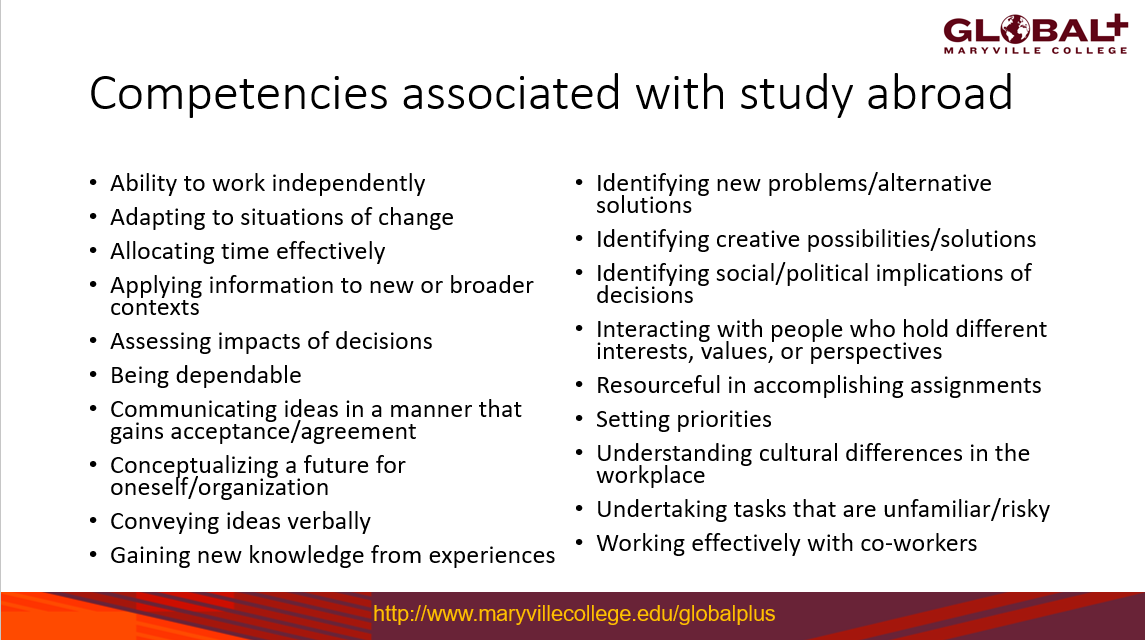Back from Education Abroad? Boost your resume and LinkedIn Profile
So you have just returned from study abroad (or maybe you are still immersed? That's ok too!)?
You might remember from your pre-departure preparation that employers value education abroad experience. It is time to start making the connections between your abroad experiences and career skills in ways that your future employers can easily recognize.
You might remember from your pre-departure preparation that employers value education abroad experience. It is time to start making the connections between your abroad experiences and career skills in ways that your future employers can easily recognize.
Here is a strategy to start this even before we come back to talk about this at our re-entry meetings.
1. Go back to your goals.
Whether these are goals you set to use this experience as your Significant Practical Experience (SPE), goals we set in OVS 203, or goals you set as part of your education abroad application, it is important to return to those to see what you have accomplished. What gaps were you trying to fill with this experience.
2. Make connections
Connect those goals to experiences you had (or are having) while you were abroad.
Need some help identifying what you learned? Here are some of the common outcomes of education abroad
3. Translate to Employer-Speak
Employers value what you have learned - but sometimes you have to put it in language that is commonly understood. A good place to start is by knowing what employers are looking for. The NACE Career Readiness Competencies are skills that employers in the USA have identified as desired qualities in recent graduates. See which of the things you have learned line up with those competencies. Maryville College highlights the "Scottie 9" on the Career Center website so you can learn more
4. Update your Resume & LinkedIn
[Don't have a LinkedIn profile - reach out to the MC Career Center to get started]
There isn't one answer that fits all for how to do this. Getting advice from the Career Center and your advisor about where it might fit best given your career goals would be a good place to start. But some of the most common options include:
a) Put it under Education.
List it as another school. For example:
Education
Bachelor of Arts (Anticipated May 2023).
Maryville College, Maryville, TN
Major: Psychology
G.P.A.: 3.7/4.0
Senior Study: Creating Together: Exploring the Connection Between Group Mindfulness Programs and Stress Reduction in College Students
Study Abroad (Summer 2022) University of Roehampton, London, England
Course: Psychology of Murder
G.P.A.:
4.0/4.0
b) Embed skills and qualities into your personal branding statement "About" you at the top of your LinkedIn profile or resume. Think of this as a 1-2 sentence elevator pitch about yourself. Incorporate skills you developed abroad. What makes you unique? You can also break out a "Skills" section on your resume.
c)Experience Section
This is particularly a good idea if you did an internship or community engagement experience while you were overseas. List any 'hard' (technical) or 'soft' (intangible) skills in the bullets under each of the positions you held. Check out this sample resume from IES Abroad
This is particularly a good idea if you did an internship or community engagement experience while you were overseas. List any 'hard' (technical) or 'soft' (intangible) skills in the bullets under each of the positions you held. Check out this sample resume from IES Abroad
Once you are back on campus, don't forget to come to our UNPACKING STUDY ABROAD WORKSHOP and join the STUDY ABROAD AMBASSADORS to have fun and practice articulating your experience!
See you soon!



